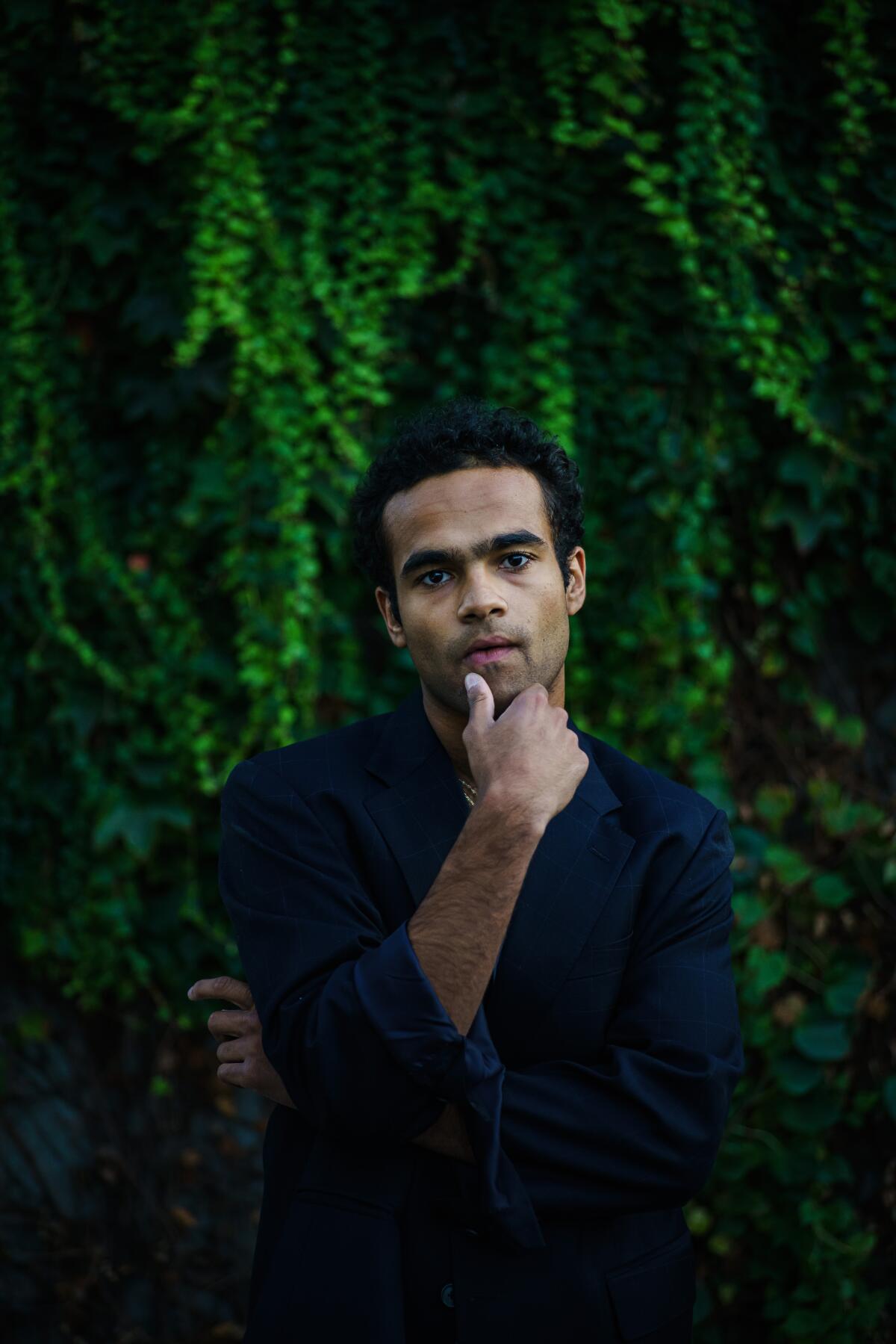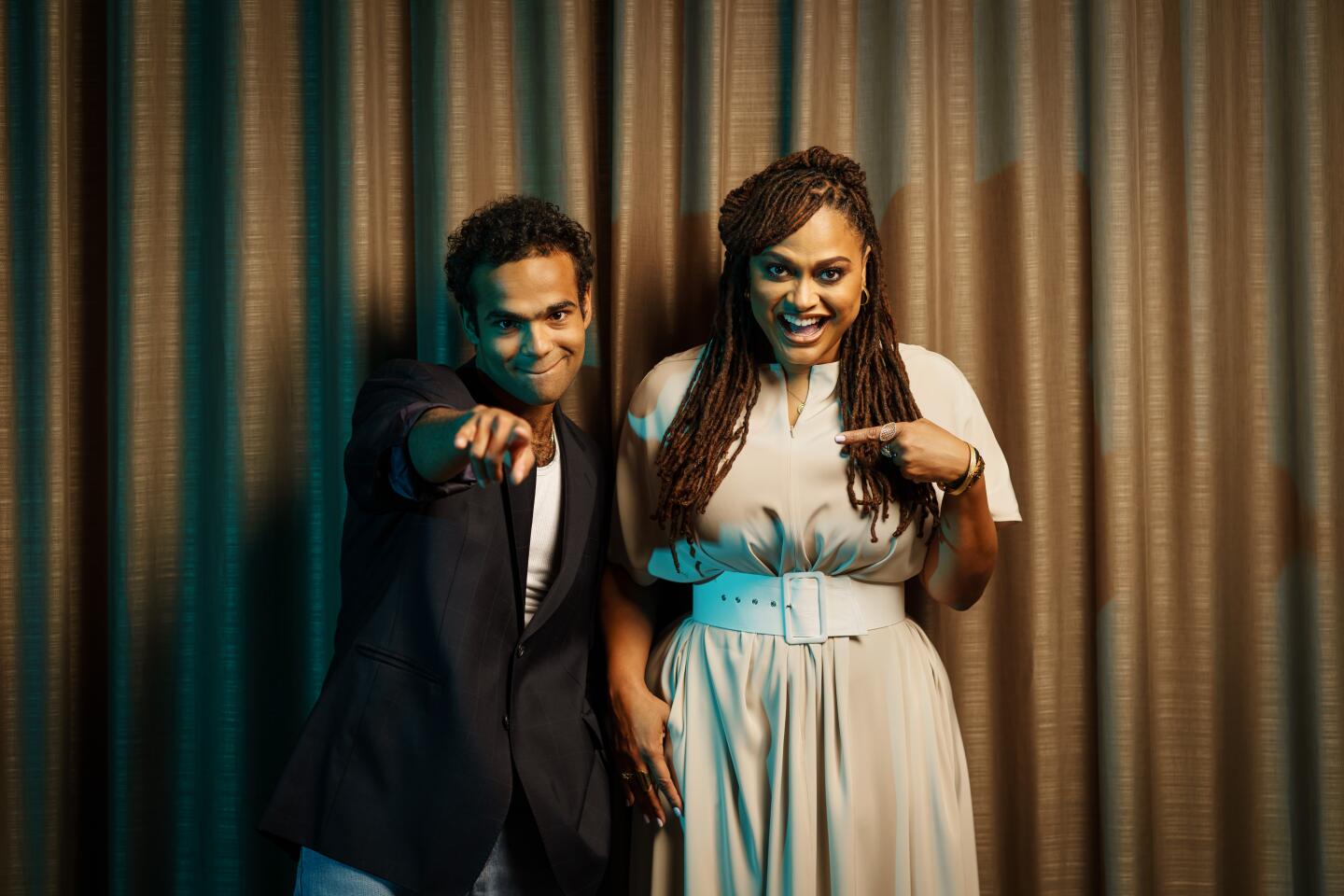19-year-old director Phillip Youmans’ ‘Burning Cane’ is a blistering take-down of the Baptist church

- Share via
Phillip Youmans was just 17 years old when he wrote, directed, shot and edited “Burning Cane,” his commentary on the relationship between religion, toxic masculinity and alcoholism in the rural South.
Now 19, Youmans has made history as the youngest filmmaker to have a film accepted to the Tribeca Film Festival and the first black filmmaker to be awarded the festival’s best narrative feature award.
“It’s all ‘pinch me’ stuff,” Youmans said last week, on the day of the film’s Netflix streaming premiere. “You make a film and you never know if anyone’s going to see it, let alone get into the festival and win it. Sitting here now thinking about it is wild.”
The film, about a devout woman’s stormy relationship with her estranged son and troubled pastor, was born out of Youmans’ upbringing in Louisiana’s Baptist church.
“It was really all motivated by questions that I had that never really got answered,” said Youmans. “Throughout my childhood, I developed a sort of spite toward everything, and I think ‘Burning Cane’ was me maturing, learning to coexist with my family and trying to create a humanizing portrait of the people I grew up around.”
Ava DuVernay, whose imprint ARRAY Releasing is distributing the film in a limited theatrical release, says she was struck by its poetic nature and fullness of story.
“It’s a film that allows me to live with the characters and feel fully immersed in a world,” she said. “I felt like I didn’t know those people [per se] but I was with them in it. I appreciate films that allow me to be there with the characters. There’s something about the luxurious nature of the film that slowly unfolds and allows you to live with it.
“At the end of the day I’m as excited by his film as I am by [Martin Scorsese’s] ‘The Irishman,’” she added. “And those are two filmmakers at two different ends of their career. Films by people in their teens are not distributed theatrically or even streaming. You hear stories about filmmakers of note now who were making films when they were young ... but 17 is pretty [young]. And it’s very special and rare, not just for us but for the film industry overall.”
Youmans’ differences with the church began when, during a service at South Carolina’s Huspah Baptist Church, the pastor led a sermon in which he equated homosexuality with the devil.
“I was sitting there with my whole family and we have members within my family who are openly gay,” Youmans recalled. “The fact that there was not much of a reaction from anyone around me I thought was really weird. That was the first straw.”
The second came after Youmans witnessed delineation between those who offered money to the church and those who could not.
“The pastor would say, ‘Everybody who offered tithes, wave your envelopes up in the air,’” he said. “And it was like a visual cue of the separation that they were trying to make. The people who couldn’t donate money were sitting there while the other people who could were waving them around, taking in the glory of what that meant.”
That holier-than-thou mentality and sense of judgment is what ultimately led Youmans to distance himself from the church, he said.
“Just the constant hypocrisy and fallacy of people preaching one thing [and doing another] or determining that religion has given them a moral compass to say nonbelievers are going to hell — it’s a big reason why when I was 12 or 13 I started praying a lot because I was afraid of burning in hell, literally. I think there’s so much about why faith is continued that’s really rooted in fear.”
The film was intended to be a “quasi-documentary, fly-on-the-wall situation” that could also serve as a filter through which to explore the ways the church can perpetuate toxic masculinity and generational cycles of trauma, Youmans said.
“I feel like with alcoholism, with toxic masculinity — all the themes that are touched on within ‘Burning Cane’ — the rigid nature of the Protestant community reinforces all of those detrimental aspects. The fact that the church can uphold traditionalist gender rules that are antiquated and reinforce those, I feel, is a toxic cycle. At the end of the day it’s supposed to be a humanizing portrait, but there is a bleakness to it that I feel is important to make clear how I feel about the themes discussed.
“I think ‘Burning Cane’ has emboldened me to be honest,” he added. “Even leading up to Tribeca I was nervous about how my family would receive everything. Their reaction to it has been a lot warmer than I gave them credit for.”
Youmans shot “Burning Cane” the summer before his senior year of high school using his savings. Many of the locations were donated.
“The biggest challenge we faced was a lack of resources through and through,” he said. “But we overcame all of those moments because we had just enough to get by. It was the best summer of my life, in all honesty. I was making a movie with my best friends.”
In addition to the Tribeca award, “Burning Cane” scored Youmans a Gotham award nomination for breakthrough director. Up next, he’s working on a narrative feature about the New Orleans chapter of the Black Panthers circa 1970. Like DuVernay, whom he names as a mentor and influence, the young filmmaker hopes to continue to make nuanced films about the black experience.
“My interest in identity really developed and cemented during my time with the New Orleans Black Panthers in high school,” he said. “I grew up in a proud black family, but I think my time with [the Panthers] and how unapologetic they were with who they were and their blackness was so dope.”
As for “Burning Cane,” Youmans just hopes audiences come away with a different perception of the church and the role of religion in upholding antiquated gender roles.
“I hope that people step away from ‘Burning Cane’ really pressing for an objective look at religion’s role in our community,” he said. “Whether or not it’s a part of our advancement as a people. And I don’t think it is. I think there’s so much about religion and Christianity that can hold us back because it perpetuates so many things. Not everybody has the same filter of hearing hate and saying, ‘OK that’s hate.’”
“What could I have been if I was this at 19?” said DuVernay after listening to Youmans speak. “I’d be in the White House. I’d be in the friggin’ White House. I’d be able to do whatever I want. It took me so long to get to a level of maturity.”
“I do hope the film can be viewed, dissected, analyzed and scrutinized without my age being the primary [focus],” Youmans added. “But I do recognize that it is what it is, I am how old I am.”
More to Read
Only good movies
Get the Indie Focus newsletter, Mark Olsen's weekly guide to the world of cinema.
You may occasionally receive promotional content from the Los Angeles Times.













